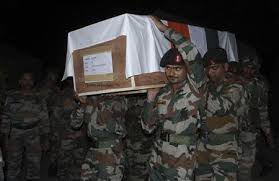 Srinagar, Aug 7: India said a group of militants from Pakistan killed five of its soldiers in an ambush along the disputed border in Kashmir on Tuesday, an accusation that threatens to derail efforts to resume peace talks.
Srinagar, Aug 7: India said a group of militants from Pakistan killed five of its soldiers in an ambush along the disputed border in Kashmir on Tuesday, an accusation that threatens to derail efforts to resume peace talks.
Pakistan rejected the allegation, saying there had been no exchange of fire along the heavily militarised border in Kashmir, the cause of two of three wars between the nuclear rivals. It said it was committed to a decade-old ceasefire and wanted to restart talks.
But the attack, one of the worst since the 2003 truce along the Line of Control (LoC) in the Himalayan region, puts the government under pressure to respond aggressively as it heads into a tough election next year.
While tit-for-tat attacks along the border are common, defence analysts said they did not expect the killings to trigger large-scale retaliation by India.
"It is in the interest of both of these nuclear-armed countries to ratchet this down," said Harsh Pant, an expert on Indian foreign and security policy at King's College London.
India summoned Pakistan's deputy envoy to New Delhi and lodged a protest over the killings in the Poonch region of Kashmir, officials said.
"The ambush was carried out by approximately 20 heavily armed terrorists along with persons dressed in Pakistan Army uniforms," Defence Minister A.K. Antony told parliament.
Earlier his ministry in a statement had directly accused the Pakistani army of launching the attack alongside militants, but it subsequently withdrew the allegation, which could have escalated tensions between the rivals.
Troops were on heightened alert along the 740-km (460-mile) Line of Control, according to an Indian army colonel in Srinagar, the summer capital of Indian Kashmir.
The attack came just days after a botched attempt to bomb the Indian consulate in Jalalabad in eastern Afghanistan, a country where India and Pakistan are competing for influence.
SOLDIERS WERE ON PATROL
Indian army sources said the latest attack took place in the early hours of Tuesday about 450 m (500 yards) inside Indian territory, where six soldiers were on patrol. One soldier was wounded.
"I assure the house that our army is fully ready to take all necessary steps to uphold the sanctity of the LoC," Antony said.
The killings caused an uproar in parliament and senior leader of the Bharatiya Janata Party (BJP), Yashwant Sinha, said the Indian army should give a "befitting reply" to Pakistan. He called on the government to abandon planned talks with Islamabad.
Dozens of BJP supporters protested outside Antony's New Delhi residence and police used water cannons to disperse them.
India says Pakistan-based militants are trying to breach the Kashmir border in increasing numbers, reinforcing Indian fears that these groups are turning their focus to Kashmir as foreign troops begin to leave Afghanistan.
But the Pakistan Foreign Ministry dismissed the allegations about the latest incident as baseless and said it hoped to begin talks soon. These were called off in January after two Indian soldiers were killed in a clash on the border. One of the bodies was mutilated, according to Indian officials.
"Pakistan is committed to a constructive, sustained and result-oriented process of engagement with India and looks forward to an early resumption of the dialogue process," the ministry said in a statement.
Islamabad has also been pushing for a meeting between Prime Minister Nawaz Sharif - who made better ties with India a theme in his election campaign in May - and his Indian counterpart, Manmohan Singh, on the sidelines of the U.N. General Assembly in New York in September, Indian officials said.
"It would be fruitless at this point to negotiate with the PMLN (Pakistan Muslim League-Nawaz)," said K.C. Singh, a former Indian ambassador.
ATTACK AIMED AT SABOTAGING PEACE TALKS?
New Delhi has sought to engage Pakistan's civilian leadership and support its peace initiatives while demanding that Pakistan's powerful military cut ties to militant groups that have carried out attacks in India, including the 2008 Mumbai assaults which killed 166 people and which India blamed on Pakistan-based gunmen.
Both Hindu-majority India and Islamic Pakistan claim Kashmir, a Muslim-dominated region.
An Indian army officer in Kashmir said the raid in January in which two soldiers were killed was carried out by Pakistan's Border Action Team. The unit includes members of Pakistan's commando Special Services Group and irregular forces like Lashkar-e-Taiba, a Pakistan-based militant group.
Army sources blamed the Border Action Team for Tuesday's attack.
"It looks like part of a pattern of sabotage activities carried out by war lobbies, by people who are not interested in peace, who are not interested in the normalisation of talks," said Imtiaz Gul, a prominent Pakistani security analyst.
A lasting peace between Pakistan and India, which have fought three wars since they were carved out of British colonial India in 1947, has long proved elusive.
Defence Minister Antony said the number of infiltration attempts from the Pakistani side of Kashmir had doubled so far this year compared to January-August of 2012.





Comments
Add new comment